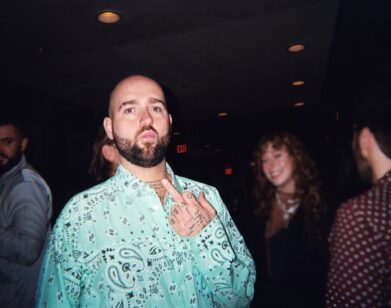IN CONVERSATION
What Jen Percy Discovered About Sexual Violence While Writing Girls Play Dead
After my ex-boyfriend strangled me, the detective questioned me about my physical response to the attack. I had been thrown to the ground, beaten, and strangled. I imagined I was the type of person who would fight, but I didn’t. I was scabbed for weeks. I pissed blood. And each time he became physical, I froze. After my ex-boyfriend’s arrest, having already ceded entire swaths of Brooklyn to him, I dropped the case because I didn’t want to see him ever again.
This is why I wanted so badly to talk to Jen Percy about Girls Play Dead, her extraordinary exploration into the psychological and physical responses to sexual assault, including tonic immobility—freezing, playing dead—and psychogenic seizures, during which victims look almost as if they’re fighting off attackers. The book, out last week, is heartbreaking, filled with liberating accounts of the varied responses to violence, and it cracked open chambers of my hardened heart. Moreover, Percy’s ability to condense and explain traumatic reactions in conversation shows how much of the subject remains woefully underexplored. She is a necessary source of clarity and expansion in a claustrophobic, murky world. Earlier this month, it was an honor to speak with her.
———
KYLE DILLON HERTZ: Hey Jen, it’s great to talk to you.
JEN PERCY: Hi, thanks for taking the time.
HERTZ: Ever since I first saw this book, I was looking forward to reading it, which seems kind of ironic to some people. So much of what could be considered great or popular writing is about escape. But I had this one experience which really transformed my life. When I was younger, I was sexually abused. I felt such incredible shame. And for years, until I read your book, I almost didn’t investigate it. Reading Girls Play Dead is an investigation into all the different responses to assault, but one of the very specific ones you bring up is this idea of tonic immobility. I was wondering if you could tell me a little bit about tonic immobility and how you became interested in it.
PERCY: Thank you so much for sharing that story. It’s interesting because that really is where the book started, and it actually began with this image of animals playing dead. I was watching videos of a couple of birds, a toad, and a possum—just a YouTube video, getting obsessed with it. It made me Google whether humans do it or not. It turns out that was true, and then I went really deep into the research and ended up landing on Jessica Mann’s testimony in the Weinstein case about tonic immobility. So that’s kind of how I got to that phrase. At first, I was just looking at the phrase “playing dead,” which is the colloquial term, but it’s actually much more nuanced and complicated than that. It’s not even playing dead—it can be a range of responses, some of which are voluntary, to help keep ourselves alive and lessen the threat of an attack. But sometimes it’s involuntary, and it can create a state that I didn’t even know existed. You can’t move any of your muscles, you can’t speak. I mean, it doesn’t even sound real. I was shocked no one was talking about it, and yet women researchers had been trying to get it out as early as the 1970s. So that kind of became the gravitational center of my book: this image of animals and people playing dead, and then it evolved into different forms with each chapter as you go through the book.
HERTZ: One part of the book even goes into the origins of thanatosis. You go back to Ovid. Were you attempting to investigate how far back it went?
PERCY: It would be possible to look at the entire history of freezing, but I wanted to give an overview—not only of how it’s evolved and changed, but how patriarchy has shaped that term and how we look at it. In the book I start with magicians, hypnosis, and mesmerism. It was this magical thing that could happen, but it was creating situations where women were vulnerable and prone to hypnosis—especially by this guy [Franz] Mesmer, who went to Europe and started hypnotizing women to cure them of ailments and ended up creating situations that made them prone to sexual assault. I looked at slavery too, because I knew there was a lot of rape going on then, and I was curious to see some of those testimonies. A lot of women talked about freezing during slavery and Reconstruction and in white mob attacks. But of course, it was also a way to keep them safe. “I just had to give myself up”—they were talking about it in a way that was still trying to explain this need to defend themselves. It was, I think, a very dangerous vocabulary to engage with, because any use of words that might suggest complicity could get you called a “whore” or a “slut.”
HERTZ: Part of what you’re describing right now is trying to put language to this biological feat—which is really ancient and also very difficult to describe. So how did you approach this gap between action and something where, for the people it’s happening to, language is elusive?
PERCY: I tried to interview a variety of subjects and just listen to the language they were using. People come up with really interesting ways of describing what happened to them. Looking at my own experience as well—and how I had described dissociation, for example—in the book, at one point it feels almost like a religious experience, just because I grew up in a way where that was part of our vocabulary. So I think we just draw on our backgrounds and experiences to say, “Well, I need to somehow understand this in some way or another.” A lot of these trauma experiences can feel like you’re in an altered state. So whether you want to reference drugs or religion, whatever cultural terms are available, you might draw on those.
How do you get to the point where you’re actually telling a story that feels safe to tell, too? We should be able to tell stories that don’t feel safe—but unfortunately, sometimes that’s not the case. So it’s about giving people more space to tell those stories. It’s interesting to think about how we put a lot of pressure on making these stories plot-driven or exciting, with different kinds of elements we apply to traditional stories. There’s an interesting frozen space that these stories sit in too, and that may cause problems for applying these kinds of stories to literature. We romanticize war stories that come from this heroic tradition, but sexual assault stories maybe have quieter parts to them—and we need to think about how to tell those stories, too.
HERTZ: Ultimately, a lot of the people that you interview in this book are not just up against men. It’s not just a societal issue, but it’s very, very specifically a legal issue. So what did you take away in terms of the intersection of law and being a victim of abuse?
PERCY: Only Illinois and New York so far have had this Criminalized Survivor Resentencing Act. And with some exceptions, most of the resentencing trials have failed. So what we’re up against really is prejudice with judges and juries and within the institution. I think it’s racist, it’s sexist, it’s so entrenched in the institutions. The questions they ask with these self-defense laws are horrible. It’s like, “Well, is there any way you could have made a better decision when this guy was strangling you in a kitchen, and you’re both on coke, and you’re out working the streets for hours, and you’re hungry? Can you make a better decision than stab him in the heart?” With Debraca Harris, who shot her landlord in the head after he was trying to rape her, [they asked], “Why don’t you just walk away?” I mean, these questions don’t actually make sense in context if you really know what’s going on, not only with their life history but with trauma. And it did feel like trauma was still kind of missing. And Debraca Harris saw the man’s face—the landlord’s face—change, which happens if you’re traumatized—things can shapeshift—to her abusive partner. Her executive function wasn’t working as it should be to make the kind of decisions they’re asking you to make. And most of the women in the situation were African-Americans in jail, most of them were mothers, and almost all of them were domestic abuse survivors. So I think that’s just a huge area that needs to be attended to, and there’s just not a lot of resources focusing on it.
HERTZ: You’re a professor, right?
PERCY: Yeah.
HERTZ: So you’re familiar with trauma-informed teaching, and we now have trauma-informed therapy. In an ideal world, what we would really want is a trauma-informed legal system. But something that you’re also saying is that even if we do have a trauma-informed legal revision, you would still then need to contend with the fact that the judges and systems themselves may be prejudiced, that the systems themselves may be prejudiced.
PERCY: Even with the quote-unquote “perfect victim”—wealthy white women—most of these cases don’t get past the police. They don’t get investigated. And even the ones that do make it to prosecution don’t usually win. I talked to experts about the ones that were successful, where experts were brought in to talk about trauma responses, and I did wonder how that could be integrated into every case. It’s a resource issue, and it’s also an issue that most of those experts that go to testify about trauma don’t get paid a lot. But again, it’s happening on state levels, and it’s starting to become integrated, but it’s absolutely not resourced in an even way across states.
HERTZ: Part of what I love so much about this book is its anecdotal quality, like Jesus’ Son, where you have all these different stories which accumulate power by their proximity to one another. This comes up in the book by Robin West, a professor of law and philosophy at Georgetown. I’m quoting from your book and she’s named this harm “consensual sexual dysphoria.”
PERCY: That was an amazing study. So West and a sociologist named Jessie Ford had been studying what’s called “unwanted consensual sex.” They gave college students surveys to fill out about sexual assaults—basically marking checks next to different options—and they wondered, “What if we have narratives instead of just check marks? Does this complicate the story?” And they found out that it did. For a lot of people, the word “assault” wasn’t a word they wanted to use or apply. There were all these other things—feeling forced to have sex based on societal norms or gendered scripts and pleasing behaviors. They were not calling it rape, not calling it assault, just going through with it. And I felt like, “Wow, that’s a huge space.” That sounds like what a lot of college students talk about when they talk about sex or hookup culture. And none of that is to say that means the assault wasn’t happening, because it is. It just opens up a space for a different kind of conversation. It was like, “Oh, now that she said that, it’s so obvious,” but I never had a term for it. I think it made me not talk about a lot of things that I’d experienced because I felt like “assault” wasn’t the right word. And a lot of friends I talked to felt that way too.
HERTZ: So, I really hate the term “survivor.” I don’t understand it.
PERCY: I don’t like it either.
HERTZ: I was a victim, and everything that’s helped me in life has been through victim services, through the Crime Victims Treatment Center, through systems that put me and others like me in this very specific box which allows for help. And one of the things that you explore is how this idea of healing is almost fairytale, mythological. And I wondered, as you finished the book, what you thought about this idea of serious and debilitating trauma that changes you just as a person. It doesn’t make you a survivor of something, but just fundamentally changes you.
PERCY: Yeah, that’s definitely an idea that I arrived on through writing this book. I have a chapter where this anthropologist talks about her experience being raped overseas and embracing a non-Western idea of trauma and healing. And that really opened up some space for thinking about the dominant narrative in Western culture about trauma and putting pressure on that. First of all, after reading self-help books in Europe, she was really annoyed by this idea that you’re supposed to just “overcome” trauma. If you were just strong enough, you could change, you’d be fine, and then the past would disappear. The culture that she noticed in Sierra Leone was much more about embracing trauma and pain and suffering as a fabric of life. You could use that in a way that was not just about erasing something in the past, but letting it become a part of you. She ended up using a very creative technique to heal—when I say “heal,” I don’t mean she just magically recovered—but it felt like she was being followed around by a ghost, basically. She was seeing things, she was having nightmares, et cetera. So she imagined seeing herself through the eyes of people in her community, and that allowed her to see herself outside of the trauma that she felt trapped inside. Looking at herself through the eyes of her neighbors, who just see her as a normal person. I think that really pushes against this idea of individualism and healing, that you have to get through everything yourself and recover in a certain way. It surprised me, and it came organically to the text. I didn’t necessarily even look for that; it just bubbled up from their stories.
HERTZ: I think it’s a powerful idea. I was wondering, did you notice a change in yourself over the course of writing this book?
PERCY: Yeah, absolutely. I mean, what’s interesting is that as I interviewed these women, I ended up taking notes about my own life, and I really built that run of memoir early in the book based on self-reflection via interviews. So in some ways, I approached people not necessarily with that intention, but it was an organic part of that experience to say, “Oh, you’re articulating something I didn’t articulate, and this is actually really useful for me thinking about how I connect to you.” So in a way, it was creating some biography via reporting. I kind of went into the book thinking I have nothing to add about myself. I have no stories. And it was only through listening and being part of this community that I felt like I could tell my own stories. So that was unexpected, and I felt like I was able to understand so much of my behavior in a way that I no longer feel ashamed about. That was certainly a huge part of all of this. I never had some of the trauma these women have experienced, but I think having all those conversations together—different kinds of trauma, small and large—was part of the project. And I felt like that also gave me space to tell stories.
HERTZ: Since this is a book of everyone’s stories, I just wanted to give you the last word. Is there a detail or moment, anything about this book or your experience writing it, that you wanted to share?
PERCY: Oh my gosh, let’s see. I mean, when I first started writing it, I was worried that everything had been written about or said already. Like, “Oh, victim behavior, rape myths—we talk about that all the time.” I had a lot of resistance. So I think it’s important to follow that intuition that there’s going to be spaces to write into and think about. There’s so much that I didn’t get to write about, but this book opens up a lot of spaces for that. That was part of the project, though—I introduced a lot of material, and having those voices should feel like a chorus that kind of overwhelms and shows that there’s a lot of people in the background that we’re not listening to. Structurally, that was kind of the goal of the project, and I think on a formal level, I was doing that. But it did make me think that we have to keep running toward these spaces that feel like we’ve talked about, but there’s still so much to be done.
HERTZ: Thank you for writing this book. I really appreciate being able to speak with you about it.
PERCY: Yeah, thank you so much. It’s such an honor to talk to you.







